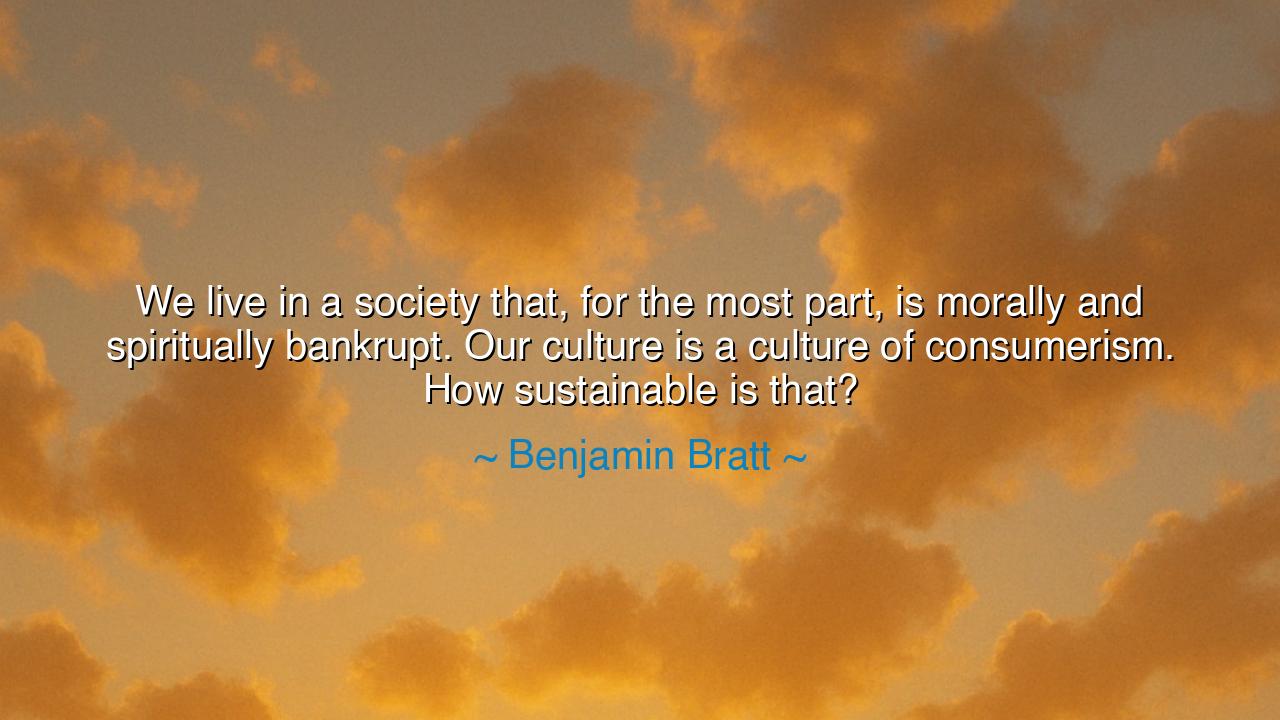
We live in a society that, for the most part, is morally and
We live in a society that, for the most part, is morally and spiritually bankrupt. Our culture is a culture of consumerism. How sustainable is that?






Benjamin Bratt, a voice not only of artistry but of conscience, once declared: “We live in a society that, for the most part, is morally and spiritually bankrupt. Our culture is a culture of consumerism. How sustainable is that?” These words strike not as idle complaint, but as a trumpet-call, awakening us to the sickness of an age that mistakes possessions for purpose and endless consumption for fulfillment. His question is not merely economic—it is spiritual. It asks whether a people who trade their souls for trinkets can endure, or whether such a society is already in decline.
The meaning is clear, and it is dire. A morally and spiritually bankrupt society is one that has lost its compass, no longer guided by truth, compassion, or reverence for the sacred. In its place stands the restless hunger of consumerism, which teaches men and women that their worth lies not in who they are, but in what they own. This emptiness fuels endless desire—more wealth, more status, more things—yet leaves the heart unsatisfied. Bratt’s question pierces the heart: if we live this way, how sustainable is our future? Can a people survive who consume without meaning, who gather without gratitude, who forget the eternal in pursuit of the fleeting?
History provides us with chilling examples. Consider the fall of Rome. Once a republic of virtue and sacrifice, Rome descended into decadence. Citizens sought luxury, spectacle, and comfort above duty. Bread and circuses replaced civic responsibility, and wealth was hoarded by the few while the many languished. The empire’s collapse was not simply military, but moral and spiritual: its bankruptcy of values left it hollow, ready to shatter when the storms came. Bratt’s warning echoes that same truth: no empire, no society, can endure when its foundation is rot.
Yet there are also stories of renewal. After the Second World War, much of Europe lay in ruins, not only materially but spiritually. Yet instead of succumbing to despair or greed, many nations embraced a vision of rebuilding based on shared sacrifice, justice, and dignity. Institutions like the welfare state, education systems, and international cooperation sought to balance material recovery with moral responsibility. Here we see that a people can rise from bankruptcy if they restore not only their markets, but their souls.
Bratt’s words also confront our modern age with fierce honesty. In a culture of consumerism, the earth itself suffers: forests stripped, oceans polluted, climates shifting under the weight of unchecked desire. The planet itself asks us the same question: How sustainable is that? To continue on this path is to borrow endlessly from future generations, leaving them not riches, but ruins. And so his lament becomes not only spiritual, but environmental, demanding that we face the costs of our endless consumption.
The lesson is profound: if we wish to endure, we must rediscover values deeper than wealth. We must reclaim compassion, humility, reverence for life, and respect for creation. We must learn again that happiness is not found in the marketplace but in the bonds of family, friendship, and service; that true strength is not measured in possessions, but in character. A society that forgets these truths will devour itself from within.
Practical action lies close at hand. Live simply, not wastefully. Support systems and leaders who protect the earth and uplift the vulnerable. Teach children that joy comes not from excess, but from gratitude. Resist the constant pull of advertising and consumerism, and choose instead to cultivate the spiritual and moral virtues that give life meaning. And above all, ask yourself daily Bratt’s question: How sustainable is that?—not only for the world around you, but for the soul within you.
Thus, let his words be carried forward as a warning and a beacon: “We live in a society… morally and spiritually bankrupt… our culture is a culture of consumerism. How sustainable is that?” Remember them, teach them, and live against the tide. For only a people who restore the soul of their culture can build a future that endures, a civilization that not only survives, but thrives in truth, justice, and harmony with creation.






AAdministratorAdministrator
Welcome, honored guests. Please leave a comment, we will respond soon